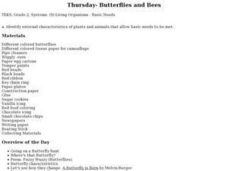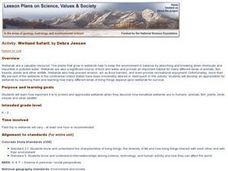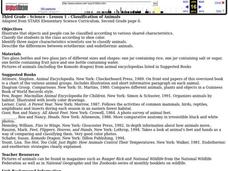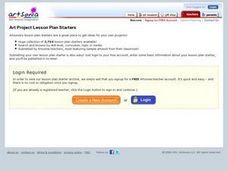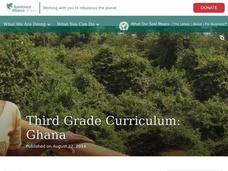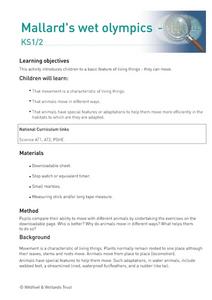Curated OER
Crazy Critters
Eighth graders visit a local park to collect insects. They record the habitats, identify the insect and write a report including the kingdom, phylum, class, and order.
Curated OER
Biology: Butterfly Activities
Second graders examine various types of butterflies and insects around their school. They identify differences between beetles and butterflies. Students examine books about butterflies, complete symmetry drawings, and make ladybug key...
Curated OER
Butterfly
Students use a purchased kit to explore the characteristics and life cycles of several butterflies including the Monarch, Western Swallowtail, Red Admiral and Painted Lady. They create a plaster casting of each species for study and...
Curated OER
Wetland Safari!
Students identify how humans, fish, plants, birds, insects and other wildlife benefit from wetland environments. They observe a wetland and its inhabitants, draw a migration map that represents how birds use wetlands in traveling long...
Curated OER
Surviving in Our Ecosystems
Third graders identify the characteristics of a frog and compare them to a human child. They draw and describe the best environment for a human to live in and the best environment for a frog to live in based on their physical...
Curated OER
Birds of Wisconsin
First graders explore the job done by ornithologists. They role play identifying the characteristics that make a bird a bird. They discuss what makes each bird species unique. Students are introduced to Wisconsin's most common and rare...
Curated OER
Classification of Animals
Third graders practice classiyfying items and identify three major characteristics scientists use to classify animals. They describe the differences between ectothermic and endothermic animals.
Curated OER
A Day in the Life
Students use their research skills to investigate the behavior and characteristics of a rainforest animal. After creating a diary entry, they illustrate the habits and life cycle of the animal. They write the diary entry from the point...
Curated OER
Types of Legs
Students identify the characteristics of the legs of arthropods as well as how they are used. They compare and contrast the legs of various types of bugs in the arthropod family. A comparison worksheet is included in with this lesson.
Curated OER
Learning About Animals' Bodies
Students research different animals (mammals, reptiles, amphibians, insects, birds, fish) and create books, murals, dioramas, puppets, and sculptures to illustrate the necessity of various body parts for overall survival. In this animal...
Curated OER
It's A Jungle Out There!
Students report on an animal according to its appearance, habitat, and characteristics.
Curated OER
Mallard's Wet Olympics
Students investigate some of the different characteristics of living things. They make observations from reading and interactive media. Students observe that animals move in different ways and have adaptations to aid in that action.
Curated OER
From Bolls To Bolts
Young scholars investigate the concept of cotton manufacturing. The skills of setting statements in chronological order is developed. They are shown pictures of products and place them in order. The lesson includes background...
Curated OER
Not Just For A Baby's Bottom
Eighth graders investigate the presence of talc in the geologic record. The different characteristics of talc is covered. The lesson includes background information for the teacher.
Curated OER
"Bug Hunt"
Fourth graders find bugs represented on a grid and then identify their name and physical characteristics that provide a picture of the bug using imagery.
Curated OER
Presto Change-o: Caterpillars to Butterflies
Young scholars use the Internet to explore the four stages of a butterfly's life cycle. They make a model of a butterfly using macaroni, sticks and leaves.
Curated OER
The Listening Walk
Students play instruments that reflect sounds in the story: hoots, toots, creaking, shrieks, clacking, crunching, whooshing, etc. They make vocal sounds from the story: whispered, sniffled, sigh, giggled, croaked, laughed. The...
Kelly's Kindergarten
May Daily Activities
Five weeks of daily activities for the month of May! With a new activity for each day of the month, your youngsters will utilize a variety of skills and practice everything from sight words and spelling to counting by twos or coloring...
Captain Planet Foundation
Energy Flow in the Garden
How can you tell what an owl has eaten? Study the food chain and flow of energy in an ecosystem by dissecting an owl pellet and noting the bones found inside. Additionally, the lesson plan includes a game about consumers and producers...
Curated OER
Surviving in Our Ecosystems
Third graders investigate the balance of ecosystems and how each species has different survival needs. They research on the internet using the site included. They then participate in activities/centers utilizing the facts they discovered.
Curated OER
Earth's Heavenly Treasures: Hummingbirds
Young ornithologists watch an informative video and use the Internet to gather data about the life, size, habitat, and migration of hummingbirds. The interdisciplinary lesson includes activities that target art, science, math, and...
Curated OER
Mallard's Wetland Olympics
Students observe plants and animals of a wetland and then compare their ability to move with different animals by undertaking the exercises on a downloadable page.
Curated OER
Week 7: Animal Adaptations - Bird Beaks
Students use tools to represent bird beaks and pick up different types of food with them in order to discover which beak would help the bird survive depending on their food type.
Curated OER
Life Cycle of a Monarch Butterfly
Students identify the stage of the butterfly's life cycle. In this life cycles lesson, students create a KWL chart about monarch butterflies. Students observe monarch caterpillars in an aquarium and identify the various stages of growth.



